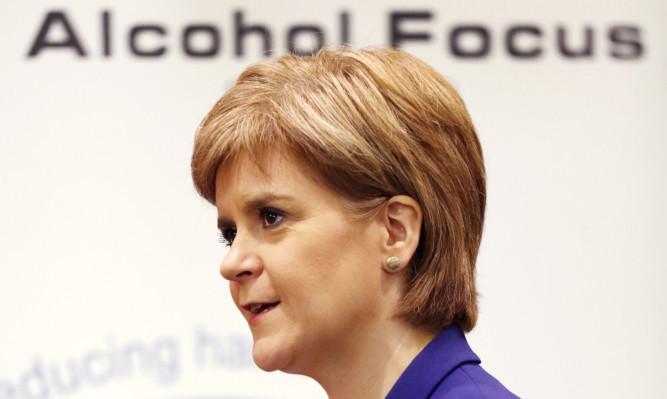The Scottish Government remains “absolutely committed” to minimum unit pricing for alcohol as an “essential part” of transforming the country’s drinking culture, Nicola Sturgeon has said.
The policy, aimed at reducing the affordability of alcohol, is currently subject to court proceedings after being challenged by the industry two years ago.
Last month, the European Court of Justice’s Advocate General confirmed minimum unit pricing can only be legally implemented if it is shown to be the most effective public health measure available.
The First Minister today welcomed the opinion, stating she was confident the Government can demonstrate minimum pricing is the most effective policy as it continues to battle a legal challenge in Scotland.
She addressed the Global Alcohol Policy Conference in Edinburgh, which was attended by more than 400 health researchers and campaigners from across the world.
“We believe that it (minimum unit pricing) is the best way to reduce the harm caused to our communities by low-cost and high-strength alcohol,” she said.
“We are convinced that it will reduce damaging alcohol consumption, improve health and save lives – and that it will do so more effectively than any alternative measures available to us.”
Minimum unit pricing is one of a range of measures brought forward by the Scottish Government to tackle the country’s alcohol problem.
Figures show Scots drink almost a fifth more alcohol than people in England and Wales while alcohol misuse is estimated to cost the country £3.6 billion each year.
Evidence from Canada shows a minimum unit price of 50p is estimated to result in 60 fewer deaths in year one and more than 300 fewer deaths each year by year 10 of the policy.
The First Minister also set out plans to “refresh” the Government’s framework for action, including more alcohol brief interventions in prisons and custody suites.
She also called for progress in broadcast advertising, currently reserved to Westminster. Ms Sturgeon wants to see a ban on alcohol advertising before the 9pm watershed to protect children.
“What Scotland is trying to do – through minimum pricing and through more than 40 other measures – is to create a cultural transformation,” she said.
“We want to change Scotland’s relationship with alcohol for good, and for the better.”
The Scotch Whisky Association challenged minimum unit pricing, arguing that it acted as a barrier to trade.
Its chief executive David Frost said: “We believe there are many effective methods that can be used to combat misuse and that appear to be working with alcohol-related deaths down 25% from a peak in 2006, rather than pursuing minimum unit pricing which would be ineffective and is likely to be illegal.
“The Advocate General’s opinion published last month encouraged us in our long-held view that minimum unit pricing is illegal when there are less trade restrictive measures available.
“We believe partnership working between government and other stakeholders is fundamental to tackling alcohol harm.
“It is, therefore, frustrating that we, along with all members of the alcohol industry, have been told we are not welcome at this week’s Global Alcohol Policy Conference in Edinburgh.”
